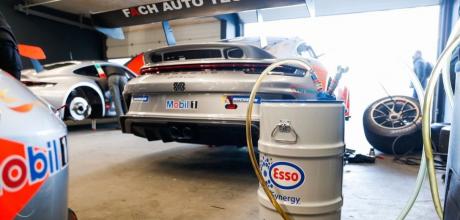Porsche eFuels

You’ve likely heard about Porsche’s investment in eFuels – here’s how the company expects it to work
After more than a century, the internal combustion engine is on a countdown timer, and so are fossil fuels. Electrification is touted at the future for vehicles, but where does that leave your beloved flat six? Fear not, for Porsche is fighting your cause, and investing heavily in a practical solution that means your 911 can be used well into the future.
The solution is eFuel, or synthetic fuel. The idea isn’t new: Germany was manufacturing synthetic fuel during World War II because it lacked oil reserves. The process may be possible but it certainly isn’t straightforward, requiring huge amounts of energy and coal for the carbon source. Therein lies the problem, because while creating synthetic fuel may be possible, to be environmentally sound that manufacturing energy and ingredients can’t come from fossil fuel. To have a green benefit, renewable energy must be used – which is exactly what Porsche is doing, in partnership with Siemens Energy.
The process, at a plant in Chile, splits hydrogen from desalinated water using electrolysis, powered by wind-generated electricity. The process is 70 per cent efficient, requiring two litres of water per litre of eFuel. For carbon dioxide, air is blown through filters that capture the carbon, then separated for further processing. Those raw, green ingredients are then processed to make e-methanol, which is further refined via a methanol-to-gasoline process that’s licensed by ExxonMobil. The result turns e-methanol into eFuel: e-petrol that’s refined to a similar octane rating to super-unleaded.
The fuel can be used in any car, and transported by existing networks because it’s a liquid, just like regular petrol. The key benefit is that any 911 can run on it without modification, unlike ethanol-rich blends of current unleaded fuel. Because the ingredients and energy come from renewable sources, the carbon dioxide produced from combustion almost balances with that captured producing the fuel.
Recently, Porsche invested $75 million in a 12.5 per cent stake in HIF Global, a holding company for eFuel production facilities around the world. This investment will help scale up the process, taking in plants in North America and Australia. The Chile plant won’t reach maximum capacity until 2025, striving for 550 million litres per year, but the new investment makes the process more efficient and therefore cost-effective. Better still, the cost of eFuel is predicted to overlap that of fossil fuels, themselves rapidly rising. Porsche claims eFuel will cost around $2/litre by 2030. In the meantime, it aims to use eFuel in its motorsport and experience fleets. The future for our flat six could be not just assured, but ecologically sound, too.

